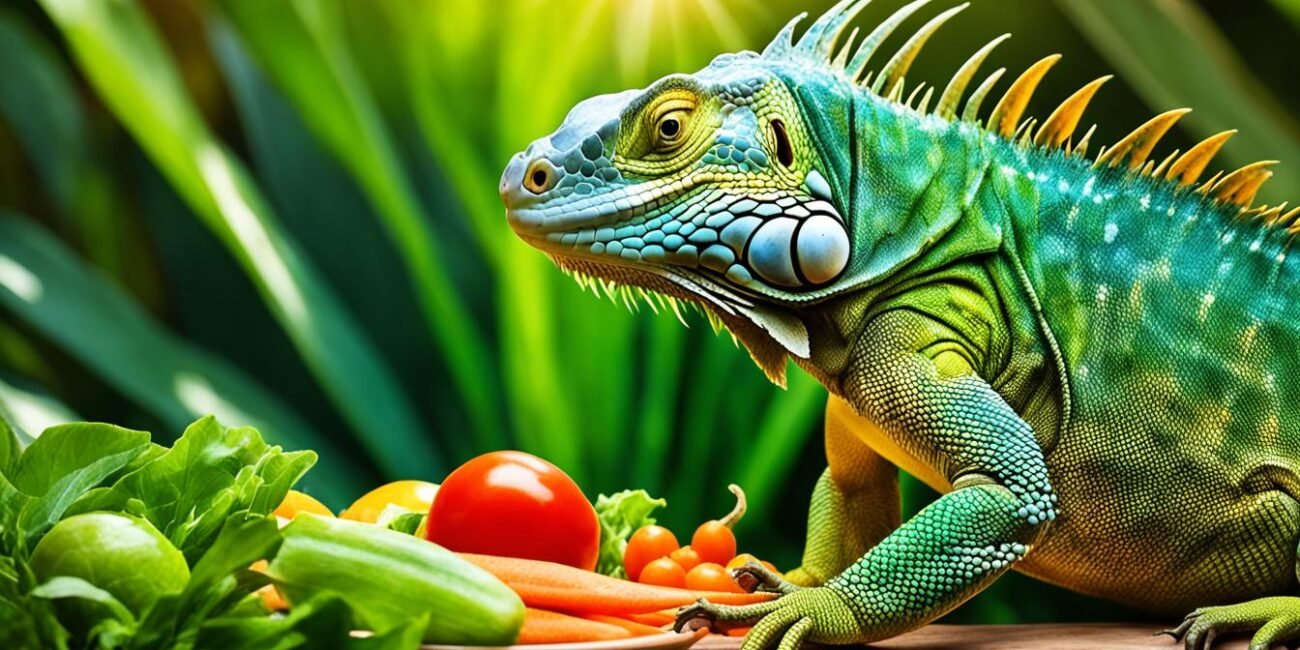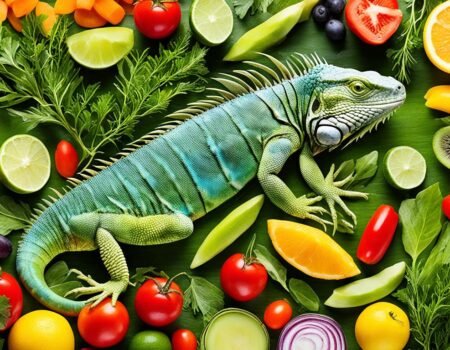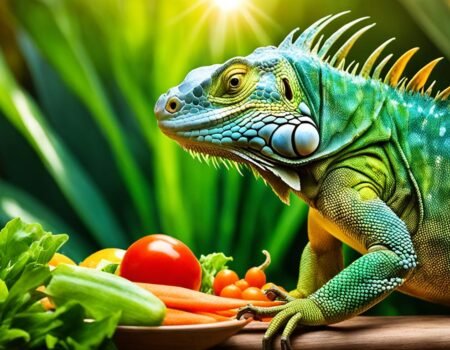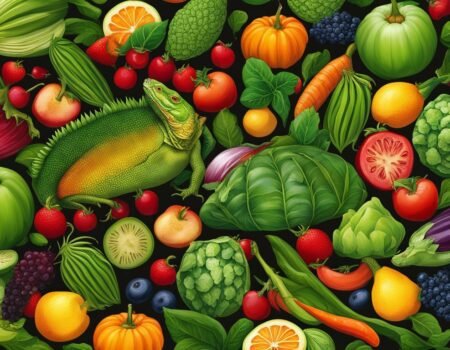Did you know that an improper diet can lead to a multitude of health problems in iguanas? Over the past 20 years, veterinarians have made significant advancements in understanding proper nutrition for reptiles, leading to a complete transformation in the recommended diet for pet iguanas. It’s crucial to feed your scaly friend the right foods to ensure their health and well-being.
So, what should you feed your iguana? How often should they be fed? And what are the best plant materials to include in their diet? In this article, we will provide you with detailed recommendations and guidelines to help you make informed choices when it comes to feeding your pet iguana. From the types of vegetables and fruits to the appropriate animal protein and vitamin supplements, we’ve got you covered.
Key Takeaways:
- Proper nutrition plays a vital role in maintaining the health of pet iguanas.
- An iguana’s diet should primarily consist of dark green leafy vegetables.
- Fruits and other vegetables can be included as supplements, but in moderation.
- Animal protein should only make up a small percentage of an iguana’s total diet.
- Vitamin and mineral supplements may be necessary, depending on the iguana’s age and specific needs.
What Should Iguanas Eat?
Iguanas are herbivorous, meaning they eat plants; specifically, they are folivores, meaning they eat leaves. In the wild, iguanas feed almost entirely on the leaves of trees and vines, plus some fruits and flowers. While most veterinarians recommend feeding only plant material to iguanas, many others feel that supplementing the total diet up to 5-10% with commercial canned or pelleted food formulated specifically for iguanas is acceptable.
How Often Should I Feed My Iguana?
Feeding your iguana the right amount of food is essential for their health and well-being. The frequency of feeding depends on the age and weight of your iguana. Let’s take a closer look:
Young Iguanas
When it comes to young iguanas, a daily feeding regimen is recommended. Their growing bodies require a constant supply of nutrients to support healthy development. By offering food every day, you ensure that they receive the necessary vitamins and minerals for optimal growth.
Adult Iguanas
As your iguana reaches adulthood, their dietary needs change. Adult iguanas can be fed daily or every other day, depending on their weight. If your iguana is overweight, feeding them every other day can help manage their weight and prevent potential health issues associated with obesity. However, if their weight is within a healthy range, daily feedings are still suitable.
Remember, every iguana is unique, and their nutritional needs may vary. Monitor their weight and behavior to determine the best feeding schedule for your iguana.
| Age | Feeding Frequency |
|---|---|
| Young Iguanas | Daily |
| Adult Iguanas | Daily or every other day (if overweight) |
Types of Plant Material for Iguanas
When it comes to iguana food recommendations and ensuring healthy nutrition for your pet, the majority of their diet should consist of dark green leafy vegetables. These should make up about 80-90% of their overall food intake. Additionally, fruits should comprise less than 20% of their diet.
For calcium-rich vegetables that are ideal for feeding iguanas, consider including collard greens, beet greens, mustard greens, turnip greens, alfalfa hay, bok choy, kale, parsley, Swiss chard, romaine, kohlrabi, escarole, and dandelion in their meals.
Aside from these calcium-rich options, there are other vegetables that can make up an additional 30-40% of an adult iguana’s diet. These include cactus, broccoli, squash, bell peppers, green beans, sprouts, sweet potato, parsnips, okra, cucumber, asparagus, mushrooms, carrots, peas, and corn.
Recommended Plant Material for Iguanas
| Dark Green Leafy Vegetables | Calcium-Rich Vegetables | Other Vegetables |
|---|---|---|
| Collard greens | Collard greens | Cactus |
| Beet greens | Beet greens | Broccoli |
| Mustard greens | Mustard greens | Squash |
| Turnip greens | Turnip greens | Bell peppers |
| Alfalfa hay | Alfalfa hay | Green beans |
| Bok choy | Bok choy | Sprouts |
| Kale | Kale | Sweet potato |
| Parsley | Parsley | Parsnips |
| Swiss chard | Swiss chard | Okra |
| Romaine | Romaine | Cucumber |
| Kohlrabi | Kohlrabi | Asparagus |
| Escarole | Escarole | Mushrooms |
| Dandelion | Dandelion | Carrots |
Remember, providing a well-balanced diet that consists of the right types of plant material is essential for your iguana’s overall health and proper nutrition.
Cautionary Vegetables for Iguanas
Iguanas require a balanced diet to thrive, but not all vegetables are suitable for their consumption. While certain vegetables like Swiss chard, spinach, and beet greens are rich in calcium, they should not be fed exclusively to your iguana. These plants contain oxalates, which can bind to other sources of dietary calcium and trace minerals, hindering their absorption in the intestine.
Additionally, vegetables like cabbage, kale, and mustard greens contain goitrogens. These substances can interfere with the function of the thyroid gland, potentially leading to goiter or hypothyroidism in iguanas if consumed in excessive amounts.
Remember: Proper nutrition for iguanas is essential for their overall health and well-being. It is important to be cautious when selecting the vegetables to include in their diet, ensuring a suitable balance of nutrients without any potential risks.
| Type of Vegetable | Considerations |
|---|---|
| Swiss chard, spinach, and beet greens | High in oxalates |
| Cabbage, kale, and mustard greens | Contain goitrogens |
While it’s important to provide iguanas with calcium-rich vegetables, it is equally crucial to offer a varied diet that includes other safe options.
Fruit Recommendations for Iguanas
Fruit can be a tasty addition to your iguana’s diet, but it should only make up a small percentage of their overall food intake. Fruits provide essential vitamins and minerals, but they are also high in natural sugars, so it’s important not to overdo it. Here are some fruits that you can offer to your iguana:
- Apples
- Pears
- Bananas
- Mangoes
- Grapes
- Star fruit
- Peaches
- Tomatoes
- Guava
- Kiwis
- Melons
- Figs
- Apricots
- Dates
- Blueberries
- Raspberries
- Strawberries
Additionally, you can offer edible flowers to your iguana as a special treat. Edible flowers not only add visual appeal but also provide different flavors for your iguana to enjoy. Some edible flowers that you can offer include geraniums, carnations, dandelions, hibiscus, nasturtiums, and roses.
Remember to always wash the fruits and flowers thoroughly before offering them to your iguana. Remove any seeds or pits that may pose a choking hazard. It’s also essential to monitor your iguana’s overall diet and ensure that the majority of their food comes from dark green leafy vegetables, as mentioned in the previous section.
Benefits of Adding Fruit to Your Iguana’s Diet
While fruits should be limited in quantity, they offer several benefits to your iguana:
- Source of natural sugars: Fruits provide natural sugars that can provide energy for your iguana.
- Vitamins and minerals: Fruits are rich in vitamins and minerals that contribute to overall health and wellbeing.
- Hydration: Fruits have high water content, contributing to your iguana’s hydration.
- Varied diet: Adding fruits to your iguana’s diet adds diversity, making mealtimes more interesting for them.
However, it’s important to maintain a balanced diet for your iguana by ensuring that the majority of their food intake consists of dark green leafy vegetables.
Animal Protein for Iguanas
While iguanas are primarily herbivorous, they can benefit from a small amount of animal protein in their diet. Foods such as crickets, mealworms, pinky mice, tofu, and hard-boiled eggs can be offered occasionally as a treat or to supplement their plant-based meals. However, it’s important to note that these protein-rich foods should make up less than 5% of an adult iguana’s total diet.
Feeding iguanas excessive amounts of animal-based protein can lead to health issues, as they are not able to digest and process it as efficiently as herbivorous animals. High-protein diets can put strain on their kidneys and liver, leading to potential complications over time.
To maintain a balanced and healthy diet for your iguana, prioritize feeding them a variety of leafy greens and vegetables as their main source of nutrition. Animal protein should be offered sparingly and in small quantities.
| Animal Protein Options for Iguanas |
|---|
| Crickets |
| Mealworms |
| Pinky mice |
| Tofu |
| Hard-boiled eggs |
Remember, a well-balanced and species-appropriate diet is crucial for the overall health and longevity of your iguana. Consult with a reptile veterinarian or an experienced iguana owner for guidance on proper feeding practices and portion sizes for your specific pet.
Vitamin and Mineral Supplements for Iguanas
In order to provide proper nutrition for iguanas, the amount and type of supplements required may vary. While there are differing opinions on this matter, most veterinarians recommend including certain supplements in an iguana’s diet to ensure optimal health and well-being.
Calcium Powder: One commonly recommended supplement for iguanas is calcium powder, specifically formulated for reptiles. It is important to lightly sprinkle a growing iguana’s food every other day with this calcium powder. This helps to ensure that the iguana receives an adequate amount of calcium, which is essential for their bone health and overall development.
Vitamin D Supplementation: Young iguanas may require vitamin D supplementation in addition to calcium. Vitamin D helps with the absorption and utilization of calcium in the body. It is important to consult with a veterinarian to determine the appropriate amount of vitamin D supplementation for your iguana based on their age and specific needs.
Calcium Supplement: Adult iguanas may benefit from a calcium supplement as well. It is recommended to lightly sprinkle their food with a calcium supplement once to twice per week. This helps to ensure that they continue to maintain proper levels of calcium in their diet, which is crucial for their overall health and well-being.
Multivitamin with Vitamin D: Additionally, adult iguanas may also benefit from a multivitamin that contains vitamin D. This can be given to them twice a month to provide a well-rounded source of essential vitamins and minerals.
Remember, it is important to consult with a veterinarian who specializes in reptiles to determine the specific needs of your iguana and ensure that they are receiving the appropriate supplements for their age and overall health.
Summary of Iguana Vitamin and Mineral Supplements
| Supplement | Usage | Frequency |
|---|---|---|
| Calcium Powder | Sprinkle on food | Every other day (growing iguanas) |
| Vitamin D | Supplement or multivitamin with vitamin D | As recommended by veterinarian (young iguanas) |
| Calcium Supplement | Sprinkle on food | Once to twice per week (adult iguanas) |
| Multivitamin with Vitamin D | Supplement | Twice a month (adult iguanas) |
Providing appropriate vitamin and mineral supplements is an important aspect of caring for an iguana and ensuring their long-term health. Be sure to follow the recommended guidelines and consult with a reptile veterinarian for personalized advice and recommendations.
Water for Iguanas
Fresh clean water is essential for the health and well-being of your iguana. Along with drinking, iguanas also enjoy taking baths in their water bowl. Providing a source of water allows them to stay hydrated and maintain proper bodily functions.
It is important to ensure that your iguana has access to fresh water at all times. Regularly check and refill their water bowl to ensure cleanliness and freshness. Additionally, misting your iguana with a water sprayer a few times a week can help keep their skin hydrated and maintain proper humidity levels in their enclosure.
Remember:
The water you offer your iguana should be clean and free from any contaminants. Avoid using chlorinated or fluoridated water, as these additives can be harmful to reptiles. Instead, provide filtered or dechlorinated water for your iguana’s drinking and bathing needs.
When it comes to bathing, iguanas may immerse themselves fully in the water or simply wade in shallow areas. This natural behavior helps them stay clean by removing dirt, debris, and shedding skin. Plus, it can be an enjoyable and relaxing experience for your scaly friend.
A friendly reminder:
Never leave your iguana unattended during bath time, especially if they are in a deep pool of water. While iguanas are strong swimmers, accidents can happen, and it’s crucial to prioritize their safety.
Providing your iguana with clean water and opportunities for both drinking and bathing will contribute to their overall well-being. Remember to monitor water quality, refresh regularly, and mist to maintain proper hydration levels. These simple practices go a long way in ensuring a happy and healthy iguana.
Commercial Diets for Iguanas
While a fresh food diet is essential for your iguana’s health, there are also commercial products available that can provide a sustainable and balanced diet. These specially formulated products are made from a combination of fruits and vegetables to meet the nutritional needs of your scaly friend. They can be used as a complete diet or as a supplement to the fresh food diet, ensuring that your iguana receives all the necessary nutrients.
“Commercial diets offer convenience and assurance in providing a well-rounded and balanced meal for your iguana. They are carefully formulated to meet the specific dietary requirements of these reptiles, ensuring optimal nutrition and overall well-being.”
The Benefits of Commercial Diets
Choosing the right commercial diet for your iguana can offer several benefits:
- Convenience: Commercial diets come in pre-packaged formats, making it quick and easy to feed your pet.
- Nutritional Balance: These diets are formulated to provide the right balance of essential nutrients, vitamins, and minerals for iguanas.
- Dietary Consistency: With commercial diets, you can ensure that your iguana consistently receives the same nutrition, eliminating variations that can occur with a fresh food diet.
- Added Supplements: Some commercial diets may contain added supplements, such as calcium and vitamin D, which are important for maintaining optimal health.
Choosing the Best Commercial Diet
When selecting a commercial diet for your iguana, it’s important to consider the following:
- Ingredients: Look for diets that contain a variety of fruits, vegetables, and other plant-based ingredients to provide a well-rounded nutritional profile.
- Brands: Opt for reputable brands that have a track record of producing high-quality reptile food.
- Recommendations: Consult with your veterinarian or fellow iguana enthusiasts for recommendations on the best commercial diets available.
Remember, while commercial diets can be a convenient option, they should not replace a fresh food diet entirely. It’s important to provide a variety of fresh vegetables and fruits to ensure a diverse and healthy diet for your iguana.
Summary of Iguana Feeding Guidelines
Proper nutrition is essential for the health and well-being of your pet iguana. Follow these guidelines to ensure that your scaly friend receives a balanced diet:
- Dark Green Leafy Vegetables: Make up the majority (80-90%) of an iguana’s diet. Optimal choices include collard greens, beet greens, mustard greens, turnip greens, and more.
- Fruits and Other Vegetables: Serve as supplements, comprising less than 20% of the iguana’s total diet. Offer a variety of options like apples, pears, bananas, bell peppers, broccoli, and squash.
- Limit Animal Protein: Animal-based proteins, such as crickets and mealworms, should make up less than 5% of the iguana’s diet.
- Supplementation: Vitamin and mineral supplementation may vary depending on the iguana’s age and specific needs. Consult with a veterinarian for appropriate recommendations.
Remember to provide fresh, clean water at all times and consider misting your iguana with water a few times a week to help maintain hydration.
To recap, prioritize dark green leafy vegetables as the foundation of your iguana’s diet, supplement with fruits and other vegetables, limit animal protein, and ensure appropriate supplementation based on individual needs.
Following these recommendations will help promote a healthy and thriving iguana companion!
Conclusion
Providing an optimal diet for your pet iguana is crucial for their health and well-being. By following these iguana food recommendations and guidelines, you can ensure that your scaly friend enjoys a vibrant, healthy life.
Remember to consult with your veterinarian for specific recommendations based on your iguana’s individual needs. They can provide tailored advice on the ideal healthy iguana food and help you create a balanced diet that meets all their nutritional requirements.
Remember, proper nutrition is key to ensuring your iguana’s longevity and overall well-being. With the right diet and care, your beloved pet can thrive for years to come.
FAQ
What should iguanas eat?
Iguanas are herbivorous and should primarily eat dark green leafy vegetables. Fruits and other vegetables can be offered as supplements.
How often should I feed my iguana?
Most young iguanas need to eat daily, while adult iguanas can be fed daily or every other day if they are overweight.
What types of plant material are suitable for iguanas?
Dark green leafy vegetables such as collard greens, beet greens, and kale are ideal for feeding iguanas. Other vegetables like cactus, broccoli, and bell peppers can also be included in their diet.
Are there any vegetables I should be cautious about feeding my iguana?
Yes, vegetables like Swiss chard, spinach, and beet greens should not be fed exclusively as they contain substances that can interfere with nutrient absorption. Cabbage, kale, and mustard greens should also be limited due to their goitrogen content.
What fruits are suitable for iguanas?
Fruits such as apples, pears, bananas, and grapes can be offered to iguanas in small quantities. Edible flowers like geraniums and hibiscus can also be given as a treat.
Can iguanas eat animal protein?
Iguanas should only consume a small amount (less than 5%) of animal protein. Crickets, mealworms, and hard-boiled eggs can be offered sparingly.
Do iguanas need vitamin and mineral supplements?
The amount and type of supplements required vary. Most veterinarians recommend lightly sprinkling calcium powder on a growing iguana’s food every other day. Young iguanas may need additional vitamin D supplementation, while adults may benefit from calcium and multivitamin supplements.
How should I provide water for my iguana?
Fresh clean water should be available at all times for your iguana. They will not only drink from the water bowl but also bathe in it. Misting your iguana with a water sprayer a few times a week can help keep them hydrated.
Are there commercial diets available for iguanas?
Yes, there are commercial products formulated from fruits and vegetables that provide a sustainable diet for iguanas. These can be used as a whole diet or to supplement the fresh food diet.
What are the main guidelines for feeding iguanas?
Iguanas should primarily be fed a diet of dark green leafy vegetables, with fruits and other vegetables as supplements. Animal protein should be limited to less than 5% of their total diet.
How can I ensure my iguana’s diet is healthy?
By following the recommended food choices and guidelines, you can ensure a healthy diet for your iguana. It’s always advisable to consult with your veterinarian for specific recommendations based on your iguana’s individual needs.









No Comment! Be the first one.